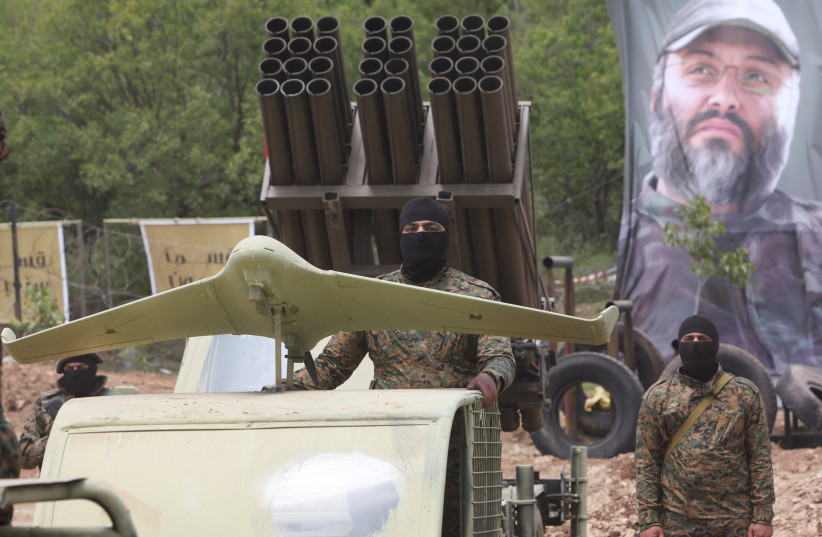Israel seeks to avoid multi-front war, Hamas has other plans
Osama Hamdan, the Hamas official who is based in Lebanon, told the Hezbollah-linked Al-Manar this week that “the battlefield is not confined to Gaza.” He was speaking about how Hamas has sought to create a multi-front threat to Israel.
Hamas has sought to increase its power in Lebanon, and Hezbollah has allowed Hamas to threaten Israel from Lebanon. This comes as Hezbollah has also launched thousands of missiles at Israel since October 7, when Hamas attacked Israel.
The overall goal here is to create a multi-front war against Israel. Israel has sought to avoid escalation on the other fronts, concentrating on Gaza. However, the mere fact that terrorist armies such as Hezbollah and Hamas have created such a massive threat illustrates how much they have grown over the last decades. Israel, in the old days, was able to confront multiple fronts, in 1967 and 1973, for instance. Israel was not concerned about fighting both Hamas and Hezbollah and other groups in the 1990s.
However, today, Hamas and Hezbollah both have increased their strength. Israel is defeating Hamas battalions in Gaza, but it is slow going, and there are growing concerns that Hamas is trying to regroup in northern Gaza. This has necessitated raids into Shifa, Zayton, and Shati last month.
Hamdan in Lebanon says that Israel is facing an “extensive resistance front.” He also referenced threats to Israel from Lebanon, Iraq, Yemen, and other places. He says Israel has not met its objectives. Of course, a terrorist official would say these types of things. Hamdan’s propaganda doesn’t have to be taken at face value. However, it is worth considering because it reflects what the Iranian-backed axis thinks.

“After 163 days, the resistance is still capable in the field battle,” Hamdan said. He said Hamas has continued to fight from areas Israel claimed to have defeated it. He also wants to exploit internal divisions in Israel. “All eyes are on the next elections in the occupied territories,” he said, adding, “Planning underway for the post-Netanyahu era.” Hamas has sought to take advantage of these domestic issues in the past; and launching October 7 was a key part of that plan.
Other countries are monitoring what may happen in Gaza. Al-Ain media in the Gulf ran an article closely examining whether Hamas is trying to regroup in Gaza. It argued that reports at The Guardian in the UK indicate Israel is facing challenges in Gaza.
The report asserts that Israel will continue to redeploy troops in and out of Gaza, but overall, the Israeli footprint will be small in Gaza. It also noted that Israel had not devised a “day after” plan. All of this appears to lead to concerns in the Gulf among Al-Ain readers in the UAE. While they may quietly want Hamas defeated, they want to see a clear victory, not “stagnation,” which the article expresses concern could be the future.
These reports, as well as others, lead to questions about the conflict that Israel faces on various fronts and “arenas.” Iran has sought to unite the arenas, which has been partially successful. It still faces challenges because Hezbollah did not fully enter the war. However, Hezbollah’s rocket fire forced Israel to evacuate parts of the north, an unprecedented decision.
Israel’s refusal to take the bait of other fronts makes the future unclear
What this means is that Israel’s decision to attempt to focus on one front and not get distracted by the Houthi attacks or dragged into a major war with Hezbollah still leaves question marks about what comes next. Iran has sought to exploit this multi-front conflict, and it’s not clear if Iran’s policy is a low-level threat in which it can dictate the level of threat as much as it wants, heating up various fronts when it chooses to.
Iran has certainly been able to do this so far for five months, more than Israel’s enemies achieved in 1967 or 1973 or other conflicts. What this means is Iran has advanced its pawns closer to Israel and gambled on Israel’s proportionate responses.
For some commentators Israel’s response in Gaza has been a phenomenal success and a quick victory in a complex urban battlefield. The big question is whether Iran views it that way as well. The propaganda from Iran and its proxies does not appear ready to concede.



Comments are closed.